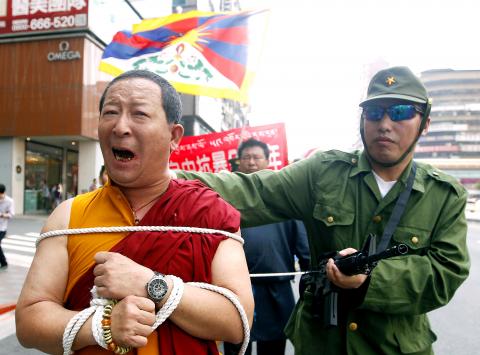|
Tibetans remember 1959 uprising
By Loa Iok-sin / Staff reporter

An activist dressed as a Chinese
soldier and a Tibetan monk perform a street drama in Taipei yesterday depicting
Tibet’s uprising 54 years ago against Chinese rule.
Photo: Chuang Pichi, Reuters
Hundreds of Tibetans and supporters
yesterday took to the streets of Taipei to commemorate the 54th anniversary of
the 1959 Tibetan Uprising and the 110 Tibetans who have self-immolated to
protest against Chinese occupation, while calling for an end to Chinese
repression of Tibetans.
“Free Tibet! Tibet belongs to Tibetans! China, get out of Tibet!” demonstrators
chanted in Tibetan, Mandarin and English as they marched from Zhongxiao Fuxing
MRT station to Taipei 101.
Leading the march was a group dressed as Chinese soldiers escorting tied-up
Tibetan monks to re-enact the arrests of monks.
Following the actors were 110 people holding portraits of the 110 Tibetans who
have self-immolated since 2009. They lay down on Zhongxiao E Road, near Guangfu
S Road, and observed a minute of silence.
“We will never give up pursuing independence for Tibet, because we can only be
truly free once Tibet is independent,” Regional Tibetan Youth Congress Taiwan
chairman Tenzin Chompel told the crowd. “We will not believe the lies of the
Chinese again — from the 17-point peace agreement to the Sino-Tibetan talks,
China has never kept its word.”
Chompel was referring to an agreement signed between the Tibetan and Chinese
governments in the 1950s, following China’s invasion of Tibet.
In the agreement, China promised to protect Tibetan culture, language, and
religion, but, the promises were broken and led to uprisings against Chinese
rule and the exile of the Dalai Lama.
Taiwan Tibetan Welfare Association adviser Tashi Tsering said Tibetans do not
hate Chinese.
“Tibetans and Chinese are all humans. As long as Chinese respect Tibetans’
rights to our own culture, religion, language and self-determination, we will
respect the Chinese as brothers and good neighbors,” he said.
Democratic Progressive Party (DPP) Chairman Su Tseng-chang (蘇貞昌) expressed his
support, saying that as a people who had struggled against an authoritarian
regime, Taiwanese understand the suffering of Tibetans and would support their
struggle for freedom.
“Even today, there is still injustice and we should give each other support
until all the repressed are liberated,” Su said.
Some Chinese — including Ao Bo (敖博), lead vocalist of the exiled Chinese rock
band Punk God, and students attending universities in Taiwan — also joined the
march.
“As a human living on Earth, I am obliged to help Tibetans gain the independence
of their country through whatever I can do,” Ao said.
“That’s why this is the sixth time I have taken part in the rally,” he said.
Several DPP politicians, including legislators Hsiao Bi-khim (蕭美琴), Yu Mei-nu
(尤美女) and Chen Chieh-ju (陳節如), as well as Taipei City councilors Chien Yu-yen
(簡余晏), Alan Lee (李慶鋒) and Hsu Chia-ching (徐佳青), also took part.
“In addition to showing support through taking part in the march, I’ve also
proposed a refugee bill granting asylum to Tibetans or other asylum seekers,”
Hsiao said. “Unfortunately, it has been blocked since March last year, when I
first made the proposal. I hope my colleagues will give me a hand so that we may
better protect rights of refugees.”
Near Taipei 101, some Chinese onlookers gave the thumbs-down to the marchers,
while police had to force a car driven by a member of a pro-unification
organization to pull over and turn off the Chinese communist music that it was
blaring out.
Meanwhile, former DPP chairperson Tsai Ing-wen (蔡英文) voiced her support in a
message on her Facebook page.
“Our grief for the more than 100 Tibetans who have self-immolated in the past
three years is indescribable. As we are free, we should fight for the freedom of
those who suffer and make the annual March 10 march a regular element in
Taiwan’s social movement,” Tsai wrote.
Former US president John F. Kennedy expressed support for West Germany and
people’s rights to pursuit freedom and human rights by saying that he was a
Berliner in a speech in 1963, Tsai said.
“Today, the 54th anniversary of the Tibetan Uprising, I offer the same support.
I am a Tibetan. We are all Tibetans,” she wrote.
Additional reporting by Chris Wang and J. Michael Cole
|
![]()
![]()
![]()